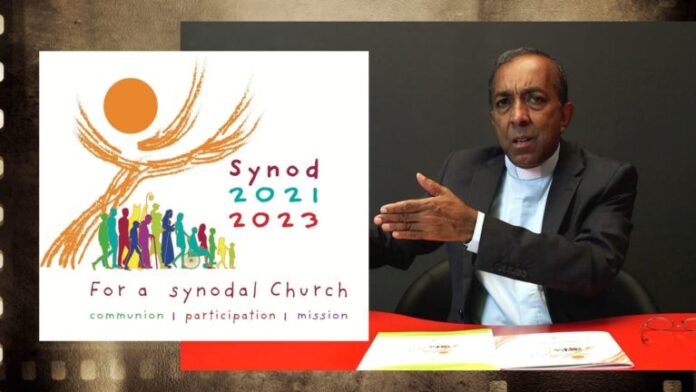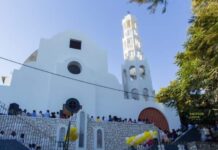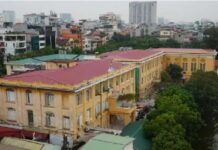Fr Vimal Tirimanna is one of the theological advisers to the synod and a professor of moral theology who teaches in Sri Lanka and Rome.
A leading Asian theologian says Pope Francis’ decision to include non-ordained women and men as voting members of October’s synod assembly is a “giant step” that will irreversibly change the Church’s decision-making processes.
Last month, the synod secretariat announced the Pope had authorised a reform to allow at least 70 non-bishops to be members of the 4-29 October synod assembly in the Vatican. This move will see women given a vote in a synod for the first time.
Fr Vimal Tirimanna is one of the theological advisers to the synod and a professor of moral theology who teaches in Sri Lanka and Rome.
“Things will never be reversed again. It’s a giant step, not a small step,” he told a webinar organised by The Tablet on the synod process on 17 May 2023.
“Even if nothing happens in the rest of the synodal process, this particular fact that 70 non-bishops are going to be there, is a big change. I don’t think it can be changed. At last, what Vatican II wanted has been realised – the process has begun.”
Fr Tirimanna, a Redemptorist priest who was involved in helping to draft the “Enlarge the Space of Your Tent” synod document, explained that Francis’ reforms are a recovery of what took place in synods during the first millennium of Christianity.
He pointed out that when Paul VI established the synod of bishops in 1965, he never ruled out that synods would evolve, with the possibility of them becoming “synods of the People of God”.
The Pope’s changes, he said, are an attempt to “walk the talk” of Vatican II.
But Fr Tirimanna said there is still a lot of resistance to the synod among bishops, and from those who erroneously think the Pope is trying to take the Catholic Church in a “Protestant” direction.
“I am a little taken aback when I hear some voices, even here in Rome, which say, ‘Well this Pope has come from nowhere, and he’s trying to make the Catholic Church a Protestant Church’,” he said.
“Such people are utterly ignorant because in the first millennium, until about the Gregorian reforms in the eleventh century [under Pope Gregory VII], all the churches, even before the great schism [1054], we all had synodal processes and a synodal way of deciding. So it is not something new being injected. It is, rather, a returning to our original sources.”
The webinar panel also included Prof Christina Kheng, who teaches pastoral leadership at the East Asian Pastoral Institute in Manila, and Dr Elissa Roper, an Australian theologian who participated in the Plenary Council synod process.
Prof Kheng said the synod “for a synodal church” process, which began in October 2021 in dioceses and local Catholic communities, had already had a significant impact. For many people, she said, it was the first time they had been asked to participate in discussions about the Church.
“When it’s done well, people get it, and they understand that this is the way of being Church,” she said. “They changed the way they see each other, and I’ve heard of bishops and clergy who have changed as a result of the process.”
She added: “The main thing people are saying is that they don’t want to go back to the old way anymore, and it cannot be business as usual any more in the Church. They’ve tasted what it’s like to be co-responsible, to participate, to be included, and they want to find ways to do this more.”
Like Fr Tirimanna, Prof Kheng was involved in reading and synthesising the reports, which became the “Enlarge the Space of Your Tent” document.
She said the lack of leadership roles for women in the Church was something raised by reports worldwide. But she said the pressing concern is developing synodal styles of leadership which include everyone, rather than focusing on a single issue.
“Imagine if we approve women’s ordination without addressing clericalism,” she said. “As a laywoman who is not ordained then I would find myself even lower down the food chain.”
Dr Roper, who was on the drafting committee for the Plenary Council, referred to the discussions about women during the Australian plenary council assembly in Sydney last July.
The whole process almost broke down when a motion on the equality of women and men in the Church failed to gain a sufficient majority of votes. The participants went back to the drawing board and agreed to a revised motion.
“It was a microcosm of what we need to do in the Church: have bishops in the room,” she said.
“We had round tables so that the reactions, the emotions, all that we bring to these discussions is laid open, and then we can discuss moving forward together.”
The panel participants agreed that the Church cannot go backwards on what the synod has started.
Fr Tirimanna noted the need for “concrete structures” to continue synodality and ensure a “culture of listening and inclusion”. He said that lay Catholics were overwhelmingly supportive of synodality, and although some bishops were resistant others were very enthusiastic. He quoted one unnamed cardinal from the United States who said that despite resistance the “process will go ahead.” The Sri Lankan theologian reminded everyone that the Holy Spirit, rather than the bishops, is leading the Church.
by Christopher Lamb – www.thetablet.co.uk, 24/05/2023
A three-year ‘synodal’ process is taking place in the Catholic Church that culminates in two Synodal gatherings in Rome in October 2023 and a year later in 2024. The overall theme is “For a Synodal Church: Communion, Participation, Mission”. Christopher Lamb hosts this live webinar where he reflects on where the synodal discussions are leading the Catholic Church with guests Dr Elissa Roper, a theologian specialising in synodality in the Catholic Church based on Australia; Vimal Tirimanna CSsR, Professor of Moral Theology at the National Seminary of Our Lady of Lanka, Kandy, Sri Lanka and the Pontifical Alphonsian Academy, Rome and Christina Kheng, A lay person from Singapore, who teaches pastoral leadership at the East Asian Pastoral Institute in Manila. She was called by the pope to be part of the Commission on Methodology that is accompanying the Synod’s work. (thetablet.co.uk)






